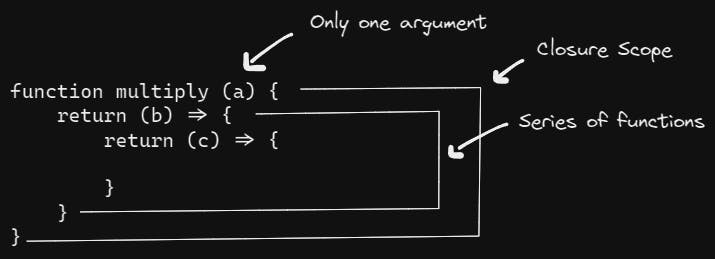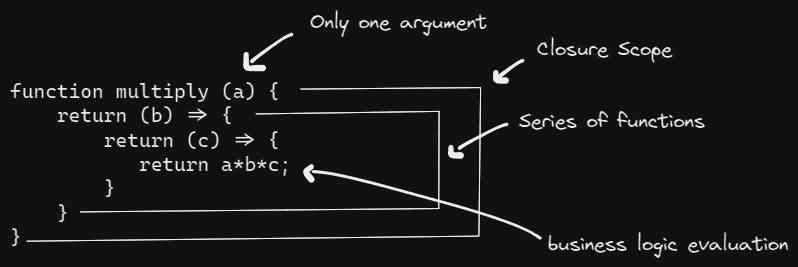Pre-requisites: Closures in JavaScript.
Currying is used to make the lighter version of the existing function. Its implementation will make the function shorter by taking the multiple parameters one at a time into a sequence of functions and making it more readable.
Let's see the concept thoroughly.
What is Currying
Currying is :
Function accepting only one argument

Having a series of nested functions in its closure scope

The last function will be returning the evaluated business logic

function multiply(a) {
return(b) => {
return(c) => {
return a*b*c;
}
}
}
multiply(2)(2)(2); // Output : 8 ;
Try to run multiply(2)(2) and multiply(2) to understand what exactly its returning.

Example:
Why use Currying
Compositions and remove repetitions
Isolate slow or expensive processes
Replace switch and ternary conditions in JS
Some real-world use cases
- While creating different URL paths for your website.
const createURL = baseURL => {
const protocol = "https";
// we now return a function, that accepts a 'path' as an argument
return path => {
return `${protocol}://${baseURL}/${path}`;
};
};
createURL("twitter.com")("alishabhale"); // Removing repetitions of passing the same varibale again and again.
- While creating info-error-warning/alerts messages for your web application.
function messagePrompts(messageType) {
return (userName) => {
return (message) => {
console.log(`[${messageType}]- Hi, ${userName} - ${message}`);
};
};
}
messagePrompts('Info')('Alisha')('Try our premium plan for 3-months free');
messagePrompts('Error')('Alisha')('There was an error while processing you payment');
messagePrompts('alerts')('Alisha')('Your plan will be expiring tomorrow.');
- Implementing the conditions without using control flow statements like if...else or switch..case, control flow expressions like ?:
const True = 1;
const False = 0;
const If = Bool => Then => Else => [Else, Then][Bool];
console.log(If(True)('1')('2')); // 1
console.log(If(False)('1')('2')); // 2
Partial application
In partial application, a function will have more than one fixed argument in its closure scope.
// Normal way
function multiply(a, b, c) {
return a*b*c
}
// Partial application
function multiply(a) {
return (b, c) => {
return a * b * c
}
}
